In our previous blog post we had discussed about What is Task in Salesforce. In these blog post we discuss about What is Event in Salesforce
Contents
What is Event in Salesforce
What is Event in Salesforce
In Salesforce, an event refers to a message that conveys significant information, typically indicating that a change has occurred. Whether it’s triggered by user activity or system processes, events play a crucial role in enabling efficient communication and coordination between different parts of a system, which is vital for integrating processes and driving automation.
Introduction to Salesforce Events
Importance of Events in Salesforce
Events in Salesforce are pivotal for real-time, event-driven architectures. They allow various components of the Salesforce platform and external systems to communicate asynchronously, ensuring that systems respond instantly to important changes.
How Events Fit in the Salesforce Architecture
Salesforce’s architecture revolves around making data and functionality easily accessible. Events fit into this architecture by enabling interaction between different processes, which may be within Salesforce or between Salesforce and external systems. Events streamline workflows, triggering actions or updates based on real-time data changes.
Types of Events in Salesforce
Salesforce supports different types of events that cater to various business needs and technical integrations.
Platform Events
Defining Platform Events
Platform events are special events in Salesforce used for real-time communication between Salesforce and external systems or within Salesforce itself. They allow for asynchronous and event-driven communication, decoupling the systems that generate events from those that process them.
Benefits of Using Platform Events
Platform events provide several advantages, such as:
- Real-time notifications and updates
- Scalability for large data volumes
- Flexibility in handling asynchronous processes
Standard Events
Examples of Standard Events
Standard events in Salesforce include user-driven events such as button clicks, field changes, or record updates. Examples include:
- Lead creation
- Account updates
- Opportunity closure
Use Cases for Standard Events
Standard events are typically used in automation workflows or triggers to update records, send notifications, or integrate processes with Salesforce features such as Lightning Web Components (LWC) or Apex.
Custom Events
Creating Custom Events
Custom events are built for specific business needs that aren’t covered by standard or platform events. These can be defined by developers to trigger specific business logic or integrations unique to a company’s processes.
When to Use Custom Events
Use custom events when the business process demands unique triggers that cannot be managed through standard or platform events. For instance, if you need to integrate Salesforce with an external system that requires custom notifications.
Understanding Event-Driven Architecture (EDA) in Salesforce
Overview of Event-Driven Architecture
Salesforce embraces an Event-Driven Architecture (EDA) where systems publish and subscribe to events. This architecture supports decoupling the system components, ensuring seamless communication and better scalability.
Benefits of Event-Driven Architecture
The key benefits of EDA include:
- Improved scalability
- Enhanced system decoupling
- More responsive systems
- Streamlined communication between components
Key Concepts of Salesforce Events
Event Producers
Event producers are the components responsible for generating and sending out events, such as user actions or system processes.
Event Consumers
Event consumers are the receivers or subscribers to the events. These could be workflows, external systems, or even other Salesforce processes.
Event Channels
Event channels facilitate the communication of events between producers and consumers. In Salesforce, the Event Bus is the mechanism that ensures events are delivered to the right consumers.
How to Create and Publish Events in Salesforce
Steps to Create Platform Events
To create a platform event, you can:
Login to Salesforce Account
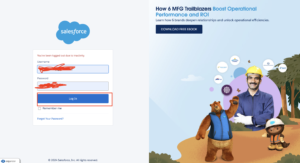
Click gear icon Navigation to Setup
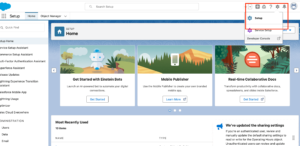
Search App launcher Calender
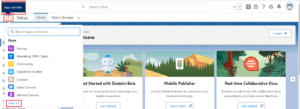
Create a new event
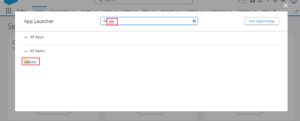
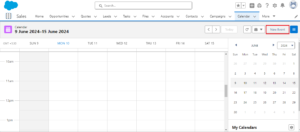
Fill the details in Start Date And End date for these event
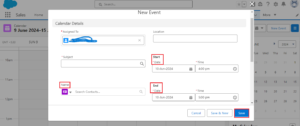
Save Event
Publishing Events from Apex
You can publish platform events using Apex triggers or controllers, enabling you to integrate with processes both inside and outside of Salesforce.
Subscribing to Platform Events
Subscribers can use Apex triggers, Process Builder, or Flow to react to platform events, enabling automation of tasks and updating records based on real-time information.
Real-World Use Cases of Salesforce Events
Integration Between Systems
Platform events are ideal for integrating Salesforce with external systems like ERPs, allowing real-time data sync and updates.
Monitoring Business Processes
Events help track and monitor various business processes, such as sales updates, ensuring that critical data points are recorded and analyzed in real-time.
Automation and Notifications
Salesforce events can trigger automation processes, like sending notifications when certain thresholds are met in sales pipelines or customer service processes.
Best Practices for Using Events in Salesforce
Considerations for Scalability
When using events, consider the volume and frequency of events to ensure your system remains scalable and performs well.
Optimizing Event Processing
Optimizing event processing involves minimizing event payload size and ensuring that subscribers are able to process events efficiently.
Debugging and Error Handling
Implement error handling and monitoring strategies for when events fail to process, ensuring a smooth operation of event-driven systems.
Event Limits and Governor Limits in Salesforce
Platform Event Limits
Salesforce imposes governor limits on platform events to maintain system performance, including limits on event publishing and delivery.
Event Usage Best Practices
Be mindful of governor limits and avoid overloading the event bus. This helps ensure that events are delivered and processed reliably.
Event Monitoring in Salesforce
Tracking and Logging Events
Salesforce allows you to track and log event activities using the Event Monitoring feature, ensuring you can audit and troubleshoot events as needed.
Tools for Monitoring Events
You can use tools like Event Log Files or Salesforce Shield to monitor and analyze events, helping to maintain the health of your system.
Conclusion
Events in Salesforce provide a powerful way to enable real-time communication and automation across systems. Whether you’re integrating Salesforce with external platforms or automating internal processes, leveraging events can greatly enhance your system’s responsiveness and efficiency. By understanding the types of events and following best practices, you can unlock the full potential of event-driven architecture in Salesforce.
We want to more about What is Event in Salesforce Click Here
FAQs
What are the key differences between standard and platform events?
Standard events are predefined Salesforce events triggered by user actions, while platform events allow for custom, asynchronous, real-time communication between systems.
Can we use Salesforce events for real-time integration?
Yes, platform events are specifically designed for real-time integration, allowing Salesforce to communicate seamlessly with external systems.
What are the governor limits for platform events in Salesforce?
Salesforce limits the number of events you can publish and deliver daily, ensuring system performance is maintained.
How do you debug event-driven systems in Salesforce?
Use Event Monitoring, debug logs, and error handling mechanisms to track and troubleshoot issues in event-driven systems.
What is the event replay ID in Salesforce?
The event replay ID is a unique identifier for events that allows consumers to retrieve past events that they may have missed.
In our next blog post we will discuss about What is Who ID in Salesforce



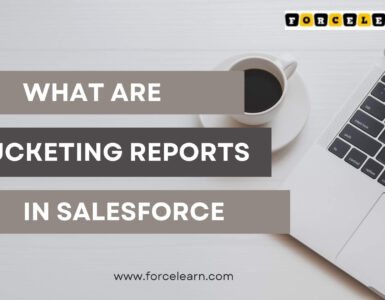
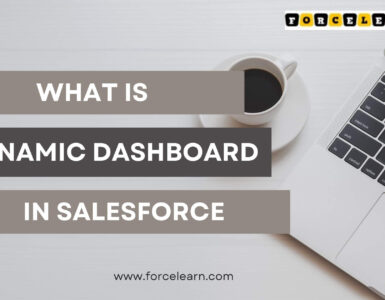
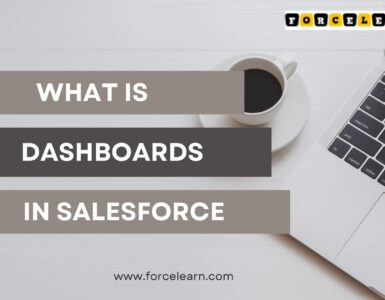


Add comment